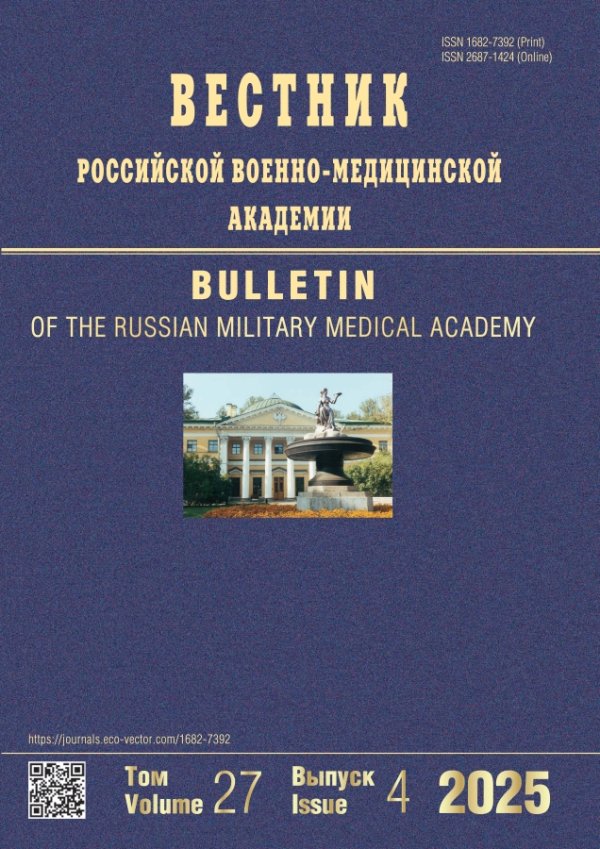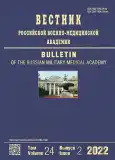Assessment of post-vaccination collective immunity against new coronavirus infection (COVID-19) among servicemen of the Armed Forces of the Russian Federation
- Authors: Azarov I.I.1, Ovchinnikov D.V.1, Kuzin A.A.1, Lantsov E.V.1, Bulankov Y.I.1, Artebyakin S.V.1, Zharkov D.A.1, Kulikov P.V.1
-
Affiliations:
- Military Medical Academy of S.M. Kirov
- Issue: Vol 24, No 2 (2022)
- Pages: 267-276
- Section: Original Study Article
- URL: https://journals.rcsi.science/1682-7392/article/view/106245
- DOI: https://doi.org/10.17816/brmma106245
- ID: 106245
Cite item
Abstract
The recent vaccination campaign targeting the new coronavirus infection (COVID-19) carried out in the Armed Forces of the Russian Federation, on the background of the current unstable global pandemic situation, makes it necessary to study post-vaccination population immunity to the SARS-CoV-2 virus and thus identify key features of immunity in organized military collectives. In the future, this will make it possible to objectively assess the risks of a worsening pandemic situation, effectively adjust the ongoing sanitary and anti-epidemic measures aimed at preserving and strengthening the health of military personnel, as one of the main conditions for maintaining the combat readiness of the Armed Forces of the Russian Federation. During a study conducted on epidemic indications, it was found that vaccination with Gam-Covid-Vac contributes to the formation of collective immunity with 95% effectiveness. A gender-based analysis of the immune response showed that the proportion of persons who lack class G immunoglobulins to SARS-CoV-2 among females is twice than that among men (9.3% and 4.7%, respectively). Seroprevalence indicators, classified by blood group, range from 94.4% (AB (IV) Rh–) to 97.4% (A (II) Rh–). There were no significant differences in seroprevalence between groups of people with different blood groups; however, the highest value of seroprevalence was seen among military personnel with blood group A (II) Rh–. In this context, it is advisable to continue monitoring the formation of immunity in individuals with various blood groups. The results obtained made it possible to form a primary medical and social “portrait” of a serviceman with the most adequate immune response to the introduction of the Gam-Covid-Vac vaccine (a man under the age of 20 with blood type A (II) Rh–) and to draw a conclusion about the high effectiveness of vaccination in military units (formations) staffed by conscripts and military educational organizations.
Full Text
##article.viewOnOriginalSite##About the authors
Igor I. Azarov
Military Medical Academy of S.M. Kirov
Email: lantsov83@mail.ru
SPIN-code: 7673-7523
Russian Federation, Saint Petersburg
Dmitrii V. Ovchinnikov
Military Medical Academy of S.M. Kirov
Email: 79112998764@yandex.ru
ORCID iD: 0000-0001-8408-5301
SPIN-code: 5437-3457
Scopus Author ID: 36185599800
ResearcherId: AGK-7796-2022
Candidate of Medical Sciences, Associate Professor
Russian Federation, Saint PetersburgAlexander A. Kuzin
Military Medical Academy of S.M. Kirov
Email: paster-spb@mail.ru
SPIN-code: 6220-1218
Doctor of Medical Sciences, Associate Professor
Russian Federation, Saint PetersburgEvgeniy V. Lantsov
Military Medical Academy of S.M. Kirov
Author for correspondence.
Email: lantsov83@mail.ru
SPIN-code: 4384-2924
Candidate of Medical Sciences
Russian Federation, Saint PetersburgYuriy I. Bulankov
Military Medical Academy of S.M. Kirov
Email: dr.bulankov@mail.ru
SPIN-code: 7997-0230
Doctor of Medical Sciences, Associate Professor
Russian Federation, Saint PetersburgSergey V. Artebyakin
Military Medical Academy of S.M. Kirov
Email: asvdoc@rambler.ru
SPIN-code: 5536-5620
Adjunct
Russian Federation, Saint PetersburgDenis A. Zharkov
Military Medical Academy of S.M. Kirov
Email: jardenmed@mail.ru
SPIN-code: 5330-1690
Candidate of Medical Sciences
Russian Federation, Saint PetersburgPavel V. Kulikov
Military Medical Academy of S.M. Kirov
Email: kpvsel@mail.ru
ORCID iD: 0000-0002-6623-9474
SPIN-code: 7920-4582
Candidate of Medical Sciences
Russian Federation, Saint PetersburgReferences
- Ivchenko EV, Kotiv BN, Ovchinnikov DV, Bucenko SA. Results of the work of the Military medical academy research institute of novel coronavirus infection problems through 2020–2021. Bulletin of the Russian Military Medical Academy. 2021;23(4):93–104. (In Russ.). doi: 10.17816/brmma83094
- Kuzin AA, Lantsov EV, Yumanov AP, et al. View of Military Epidemiologists on the Problem of Global Spread of a New Coronavirus Infection. Epidemiology and Vaccinal Prevention. 2021;20(3):53–59. (In Russ.). doi: 10.31631/2073-3046-2021-20-3-53-59
- Salukhov VV, Kharitonov MA, Kryukov EV, et al. Topical issues of diagnostics, examination and treatment of patients with COVID-19-associated pneumonia in different countries and continents. Medical Council. 2020;(21):96–102. (In Russ.). doi: 10.21518/2079-701X-2020-21-96-102
- Zhdanov KV, Kozlov KV, Ivanov KS, et al. Military infectiology for biosecurity control. Kuban Scientific Medical Bulletin. 2020;27(4): 38–50. (In Russ.). doi: 10.25207/1608-6228-2020-27-4-38-50
- Kryukov EV, Cherkashin DV, Reutskiy IA, et al. Differentiated approach to the implementation of preventive and anti-epidemic measures among military personnel based on the COVID-19 disease risk assessment scale. Infectious diseases: News, Opinions, Training. 2021;10(2):31–38. (In Russ.). doi: 10.33029/2305-3496-2021-10-2-31-38
- Zhao J, Yuan Q, Wang H, et al. Antibody Responses to SARS-CoV-2 in Patients With Novel Coronavirus Disease 2019. Clin Infect Dis. 2020;71(16):2027–2034. doi: 10.1093/cid/ciaa344
- Suhandynata RT, Hoffman MA, Kelner MJ, et al. Longitudinal Monitoring of SARS-CoV-2 IgM and IgG Seropositivity to Detect COVID-19. Appl Lab Med. 2020;5(5):908–920. doi: 10.1093/jalm/jfaa079
- Zhogolev KD, Zhogolev SD, Kuzin AA, et al. Sravnitel'naya kharakteristika vaktsin protiv koronavirusnoi infektsii COVID-19. IХ Luga scientific readings. Proceedings of the international scientific conference «Sovremennoe nauchnoe znanie: teoriya i praktika». Saint Petersburg, 2021. P. 99–106. (In Russ.).
- Zhogolev SD, Gorenchuk AN, Kuzin AA, et al. Izuchenie immunologicheskoi ehffektivnosti i reaktogennosti vaktsiny protiv novoi koronavirusnoi infektsii pri vaktsinatsii voennosluzhashchikh. IХ Luga scientific readings. Proceedings of the international scientific conference «Sovremennoe nauchnoe znanie: teoriya i praktika». Saint Petersburg, 2021. P. 106–110. (In Russ.).
- Zhogolev SD, Gorenchuk AN, Kuzin AA, et al. Immunogenicity and reactogenicity of the COVID-19 vaccine when it is used in military personnel. Problems in medical mycology. 2021;23(2):79. (In Russ.).
- Zhogolev SD, Gorenchuk AN, Kuzin AA, et al. Evaluation of vaccine "Sputnik V” immunogenicity and reactogenicity when it is used in military personnel. Bulletin of the Russian Military Medical Academy. 2021;23(4):147–152. (In Russ.). doi: 10.17816/brmma80760
- Kryukov EV, Trishkin DV, Ivanov AM, et al. Comparative Cohort Epidemiological Study of Collective Immunity against New Coronavirus Infection among Different Groups of Military Personnel. Annals of the Russian academy of medical sciences. 2021;76(6): 661–668. (In Russ.). doi: 10.15690/vramn1583
- Logunov DY, Dolzhikova IV, Zubkova OV, et al. Safety and efficacy of an rAd26 and rAd5 vector-based heterologous prime-boost COVID-19 vaccine: an interim analysis of a randomised controlled phase 3 trial in Russia. Lancet. 2020;396(10255):671–681. doi: 10.1016/S0140-6736(20)31866-3
- Kryukov EV, Salukhov VV, Kotiv BN, et al. Factors affecting the content of Ig G-antibodies to S-protein SARS-CoV-2 in the blood of reconvalescents after new coronaviral infection (COVID-19). Medical Council. 2022;(4):51–65. (In Russ.). doi: 10.21518/2079-701X-2022-16-4-51-65
- Kryukov EV, Trishkin DV, Salukhov VV, et al. A Prospective Multicenter Randomized Study State of Humoral Immunity after a New Coronavirus Infection (COVID-19) of a Mild or Asymptomatic Course. Annals of the Russian academy of medical sciences. 2021;76(4):361–367. (In Russ.). doi: 10.15690/vramn1582
- Minnullin TI, Stepanov AV, Chepur SV, et al. Immunological aspects of SARS-CoV-2 coronavirus damage. Bulletin of the Russian Military Medical Academy. 2021;23(2):187–198. (In Russ.). doi: 10.17816/brmma72051
- Nikitin YuV, Alexandrova YeV, Meshkova MYe. Immunological indicators and their predictive value in patients with COVID-19 of varying severity. Disease Treatment and Prevention. 2021;11(4): 12–20. (In Russ.).
- Mayanskiy NA. Immunity to COVID-19 and issues of screening for SARS-Cov-2 antibodies. Bulletin of Russian State Medical University. 2020;(3):27–30. (In Russ.). doi: 10.24075/vrgmu.2020.035
- Dan JM, Mateus J, Kato Y, et al. Immunological memory to SARS-CoV-2 assessed for up to 8 months after infection. Scince. 2021;371(6529):eabf4063. doi: 10.1126/science. abf4063
- Khoury DS, Cromer D, Reynaldi A, et al. Neutralizing antibody levels are highly predictive of immune protection from symptomatic SARS-CoV-2 infection. Nat Med. 2021;27:1205–1211. doi: 10.1038/s41591-021-01377-8
- Bartsch YC, Fischinger S, Siddiqui SM, et al. Discrete SARS-CoV-2 antibody titers track with functional humoral stability. Nat Commun. 2021;12(1):1018. doi: 10.1038/s41467-021-21336-8
- Popova AYu, Ezhlova EB, Mel’nikova AA, et al. Assessment of the Herd Immunity to SARS-CoV-2 among the Population of the Leningrad Region during the COVID-19 Epidemic. Problems of Particularly Dangerous Infections. 2020;(3):114–123. (In Russ.). doi: 10.21055/0370-1069-2020-3-114-123
- Popova AYu, Ezhlova EB, Mel’nikova AA, et al. Collective immunity to SARS-CoV-2 of Moscow residents during the COVID-19 epidemic period. Infectious diseases. 2020;18(4):8–16 (In Russ.). doi: 10.20953/1729-9225-2020-4-8-16
- Popova AYu, Ezhlova EB, Mel’nikova AA, et al. Herd immunity of SARS-Cov-2 among the population of Kalinigrad Region amid the COVID-19 epidemic. Journal Infectology. 2020;12(5):62–71. (In Russ.). doi: 10.22625/2072-6732-2020-12-5-62-71
- Popova AYu, Ezhlova EB, Mel’nikova AA, et al. Herd Immunity to SARS-CoV-2 among the Population in Saint-Petersburg during the COVID-19 Epidemic. Problems of Particularly Dangerous Infections. 2020;(3):124–130. (In Russ.). doi: 10.21055/0370-1069-2020-3-124-130
- Tryshkin DV, Kryukov EV, Chernetcov VA, Chernov SA. Use of anticospecial plasma from healthy vaccinated people in the treatment of patients with severe coronavirus infection. Military medical journal. 2021;342(2):66–68. (In Russ.).
- Kuzin AA, Kucherov AS, Polovinka VS, Yumanov AP. Modern system of sanitari-anti-epidemic support of the armed forces of the Russian Federation. Russian Military Medical Academy Reports. 2020;39(S4):52–56. (In Russ.).
- Zhdanov KV, Kozlov KV, Bulankov YI, et al. Optimization of diagnosis of SARS-CoV-2 infection using polymerase chain reaction in a large multi-specialty hospital. Bulletin of the Russian Military Medical Academy. 2020;22(2):7–10. (In Russ.).
- Alimbarova LM, Kazakov SP, Kryukov EV, Chirkova EYu. Otsenka kommercheskikh test-sistem na osnove immunokhimicheskogo metoda dlya opredeleniya urovnya spetsificheskikh antitel v syvorotke/plazme bol'nykh COVID-19. Proceedings of the I All-Russian congress with international participation «Akademiya laboratornoi meditsiny: noveishie dostizheniya». Moscow, 2021 May 25–27. P. 49–50. (In Russ.).
- Artebyakin SV, Lantsov EV, Kuzin AA. Aktual'nost' i metodicheskii podkhod k izucheniyu kollektivnogo immuniteta k novoi koronavirusnoi infektsii v organizovannykh kollektivakh. Proceedings of the Оnline-congress with international participation: «Molekulyarnaya diagnostika i biobezopasnost'-2021. COVID-19: ehpidemiologiya, diagnostika, profilaktika». Moscow, 2021. P. 18. (In Russ.).
- Kazakov SP, Alimbarova LM, Chirkova EYu, et al. Izuchenie ehffektivnosti test-sistem na osnove immunokhimicheskogo metoda dlya opredeleniya spetsificheskikh antitel klassov IgM, IgG k koronavirusu SARS-CoV-2. Journal Infectology. 2021;13(1S):53–54. (In Russ.).
Supplementary files








